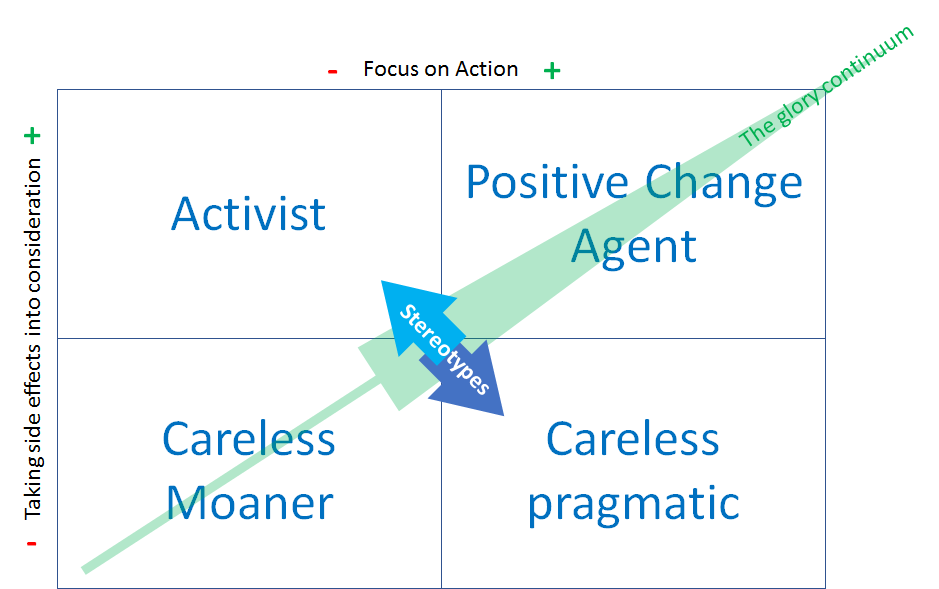What’s wrong with idealism?
It is an unreachable utopia that people dream about instead of acting out. And anyway, who can act out something unachievable?
John Galsworthy once said:
Idealism increases in direct proportion to one’s distance from the problem.
What’s wrong with pragmatism?
I’ll build on John Galsworthy’s quote by adding:
Pragmatism increases in direct proportion to one’s distance from the (negative) consequences of the pragmatic decision. ☺
In fact, it’s damn easy to take courageous decisions when you are not the one bearing the negative side effects.
In effect, when facing a roadblock, the first thing pragmatic people let go is not their objective but their values. Why? Well, most argue “We do not live in an ideal world”, “This is how things get done over here”, “The end justifies the means”…
Having navigated the corporate world for 20+ years, I met nice and less nice people. That’s no news. My biggest deception was to witness nice people behaving repeatedly as the average jerk would.
How come?
The question queued in my mind waiting for clues. Until I watched that mafia movie. And bang there was the light!
Being a nice guy is not about behaving nice
Once upon a time, there was a caring godfather, doing good to his community, protecting the weak, redistributing wealth… The perfect good Samaritan!
Being a nice guy is not about how much good we do but rather about how much evil we avoid. — Click to tweet
That movie was an eye-opening moment. Since I’ve observed how people behaved in their everyday life. For example, a manager would protect her/his team… at the expense of others. “I need to fight for my team!” is a usual “noble” justification for internal politics and fights. The kind of destructive behaviors over the long term that stems from a closed scarcity mindset. I also recognized this behavior in all other “tribal-like” contexts: protecting our children while wronging others, serving our political party at the detriment of our country, protecting our country by harming neighbors…
Unfairly to pragmatism, this line of conduct is carried under its cover.
I said to myself, maybe we should reconcile pragmatism with idealism… to reconcile objectives with values… to reconcile people with themselves. — Click to tweet
A pragmatic model to idealism
Let’s consider two factors to differentiate between idealists and pragmatists:
- Focus on action.
- Taking into consideration the side effects of our decisions.
Combining the two above axes yield 4 possible profiles:
- No Action / Omitting side effects: The Careless Moaner.
- Action / Omitting side effects: The Careless Pragmatist.
- No action / Considering side effects: The Activist.
- Action / Considering side effects: The Positive Change Agent.

These are the 4 guys we meet every day, so let’s get to know them better…
1. The Careless Moaner
Ever sat with a negative person that sucked your energy and made you feel bad by back-talking others. Feels like every topic on earth is in her/his circle of concern but none is in her/his circle of influence or control. No action is ever taken. Just talking… or more precisely moaning. Well, you’ve just met the Careless Moaner.
2. The Careless Pragmatist
There are 2 ways of solving problems:
- Creativity, hard work… and care about others and the environment.
- Creativity, hard work… and absence of care.
I’m not sure anyone is happily drawn to the second option, yet many of us end up leaning towards that line of conduct in the corporate world. That’s when our objectives overtake our values. You may say, I’m not that kind of guy! Well, think twice.
If we consider that values are what is important to us in life, I got a question for you. Is your health of importance? Do you care about your family? If you answered yes, please explain how come most managers prioritize their work over anything else. And that’s only a naive example compared to what really happens daily inside companies: manipulative negotiation tactics, marketers deceiving consumers, candidates happily over-claiming in résumés, internal politics…
That’s the stereotyped behavior of the Careless Pragmatist. S/he does what it takes to make things happen regardless of collateral damages.
3. The Activist
That day the queue at the highway’s toll was massive. It wasn’t a holiday nor a rush hour. As we got closer to the toll gate, there was an incredible number of motorbikes. Another Harley gathering? Not at all, those guys were blocking purposefully the way. What for? Later I got to know that they were pressuring the motorway company to grant bikers a discount on the toll. I’m not sure it’s the number one priority for my country.
That day, my view of activism changed. In today’s world, unfortunately, it has become a competition for loudness, not importance to society. Each group, in his restricted area of interest, is trying to pump resources. The corollary is that priorities are brushed aside. We firefight whatever is brought to our attention. We forget it the next day to the favor of the new hot matter blocking our way or roaring in our ears.
Which leads to my preferred profile… ☺
4. The Positive Change Agent
To exemplify that profile I’ve picked two examples:
1. Gunter Pauli is an exceptional entrepreneur by most standards! Since the 80’s he has been into ecological business. He is now the most successful advocate of the “circular economy”. You know that zero waste economy based on mimicking mother nature; every species’ waste is food or shelter for another. Doing so, he has been able to prove that ecological business can be profitable even taking over multi-national companies like Procter & Gamble.
2. I recently attended an inspiring presentation. It was titled “A failed dream”. The narrator explained how her dream of becoming a journalist did not come to life. Curiously, with hindsight, she was happy about it. As her dream did not materialize, she found herself involved in her community doing real stuff (positive change agent) rather than talking about it (activist) at best or publicly criticizing at worst.
The Positive Change Agent rather than ignoring or criticizing the issue takes the realms in hand and makes things happen. Leading by example is her/his motto! S/he puts into practice a famous quote by Gandhi:
Be the change you want to see in the world — Click to tweet
What can I do about it?
Sorry guys there is no easy solution but there is some hope we can explore.
- Patience: You shouldn’t only adopt solutions, you should also build solutions. In a world where speed (or shall I say impatience) is the norm. Everyone wants it all, and wants it now! We end up confusing our ambitions with our abilities. The “practical” component of pragmatism makes us focus on what seems feasible… short term. We often settle for the “less worst” solution rather than the right one, excluding from our circle of consideration most options that would require time to unfold. Taking into consideration the long term requires commitment. But not a commitment to our goals only (as most achievers would think), to our values also.
- Watch who you look up to we subconsciously adopt behaviors of people we hang with (including authors, journalists…). This is all the more true for those we look up to. The trust we feel permits that transformational influence happens insidiously.
- Redefine success:
“To me, success is to prioritize our values over our goals.” — K
Click to tweet
“If I’m not proud of the WHY and the HOW maybe the WHAT isn’t worth it.” — K
Click to tweet
Why most people do not want to do anything about it?
Because as Carl Yung said, “An ideal is a judge”. Keeping it in mind will always remind us how far we are from it. It feels like a chronic failure. The solution is to set 2 separate benchmark points:
1. As an individual: do not compare yourself to a static image of where you stand today vs. others. There will always be someone better than you at something. Rather, compare yourself to who you were yesterday. Measure progress.
“From others, you shall seek inspiration. With your own self, you shall compete” — K
Click to tweet
2. For your acts: make it a disciple to a. know, b. admit and c. state with clarity what the ideal option should be even if it is totally unfeasible. It draws a direction to follow and triggers humility. The anchor point should always be that ideal state, not the “less worst” one you’ve settled to even it is considered as a CBA (Current Best Approach). Then act against it, iterate, you’ll be making progress.
FINAL TWEET
Idealism is what you allow to take control of your life. Everyone idealizes something:
. Idealistic people idealize idealism
. Pragmatic people idealize pragmatism
— K
Click to tweet
If interested in learning how to work with your nature and not against it, check out my book at WorkWithYourNature.com
